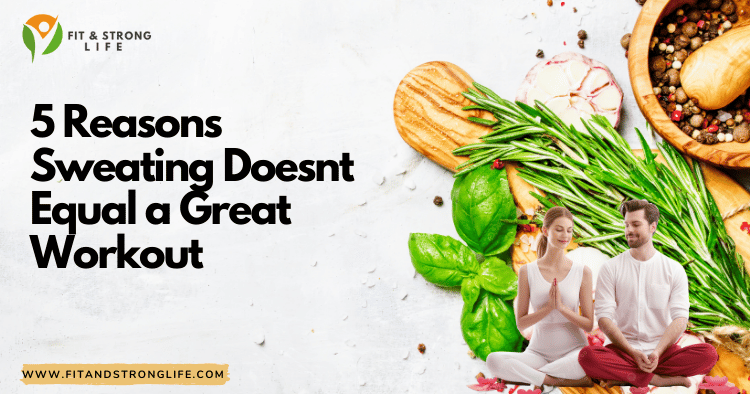Table of Contents
- Introduction
- 1. Sweat is Not Just a Measure of Effort
- 2. Hydration Matters More Than You Think
- 3. Individual Differences in Sweating
- 4. Quality Over Quantity: The Importance of Exercise Intensity
- 5. The Role of Environment and Clothing
- Conclusion
- FAQs
Introduction
When it comes to working out, many people believe that the more you sweat, the better your workout. While it’s easy to assume that sweating indicates a great session, this is a myth that deserves to be debunked. In this article, we’ll explore five compelling reasons why sweating doesn’t necessarily correlate with an effective workout. So, lace up those sneakers and let’s dive in!
1. Sweat is Not Just a Measure of Effort
Sweating is your body’s natural response to regulate temperature, not a direct indicator of how hard you’re working out. Factors such as exercise type, intensity, and duration influence how much you sweat.
Note: A high-intensity interval training (HIIT) session may produce less sweat than a long, steady-state cardio session, even if the HIIT workout is more effective for building strength and endurance. According to the American Council on Exercise, sweat production can vary widely depending on the individual and conditions, meaning that someone who sweats less can still have a highly effective workout.
Quick Fact:
- Sweat Rate: On average, people sweat between 0.5 to 4 liters per hour during intense exercise.
2. Hydration Matters More Than You Think
The body’s ability to sweat is highly dependent on hydration. If you’re dehydrated, your body may struggle to produce sweat, regardless of your workout intensity.
Reminder: Drinking enough water before, during, and after your workout is crucial for maintaining optimal performance and recovery. According to the Institute of Medicine, men should aim for about 3.7 liters (13 cups) and women about 2.7 liters (9 cups) of total beverages daily, including water.
For more insights on hydration strategies, check out our article on 10 Hydration Strategies to Boost Fitness Performance.
Hydration Tips:
| When to Hydrate | Amount |
|---|---|
| Before workout | 16-20 oz (2-2.5 cups) 2-3 hours prior |
| During workout | 7-10 oz (0.875-1.25 cups) every 10-20 minutes |
| After workout | 16-24 oz (2-3 cups) for every pound lost |
Hydration is key to maintaining a healthy sweating response, thus ensuring your workouts are effective.
3. Individual Differences in Sweating
Everyone’s body is unique, and so is their sweating pattern. Genetics, fitness level, and acclimatization all play a significant role in how much a person sweats.
Insight: For instance, seasoned athletes often sweat more efficiently because their bodies are adapted to cool themselves down effectively. On the other hand, someone new to exercise may not sweat as much despite exerting similar effort.
A study published in the Journal of Applied Physiology found that trained individuals have a higher sweating rate compared to untrained individuals at the same exercise intensity.
Key Takeaway:
Just because you’re not sweating as much as your workout buddy doesn’t mean you’re not putting in the effort!
4. Quality Over Quantity: The Importance of Exercise Intensity
Focusing solely on sweat can lead to overlooking the quality and intensity of your workouts. High-intensity workouts can provide substantial benefits in terms of cardiovascular health, muscle strength, and fat loss, regardless of the amount of sweat produced.
Tip: For more tips on effective workouts, explore our article on 10 Essential Strength Training Tips for Beginners.
Comparison Table: Sweat vs. Workout Quality
| Workout Type | Sweat Level | Intensity | Benefits |
|---|---|---|---|
| HIIT (High Intensity) | Moderate | High | Increased metabolism, muscle gain |
| Steady-State Cardio | High | Moderate | Improved endurance, fat burn |
| Strength Training | Low | High | Muscle building, strength gains |
Instead of focusing on how much you sweat, consider tracking your heart rate or workout performance to gauge effectiveness.
5. The Role of Environment and Clothing
The environment where you work out can significantly impact your sweating levels. Hot and humid conditions can cause you to sweat more, while cooler environments can keep sweat levels lower, even if the workout intensity remains the same.
Advice: Additionally, the type of clothing you wear can either trap heat or promote airflow. Lightweight, moisture-wicking fabrics can help manage sweat, while heavier materials may retain heat and moisture.
For more on effective workout gear, see our article on Top 10 Essential Fitness Gear for 2024.
Environment Tips:
- Indoor Workouts: Use fans or air conditioning to maintain a comfortable temperature.
- Outdoor Workouts: Choose early morning or late evening for cooler temperatures.
- Clothing Choices: Opt for breathable, moisture-wicking fabrics to stay comfortable.
Conclusion
While sweating can be a sign of exertion, it is not a reliable measure of workout effectiveness. Focusing on hydration, individual differences, workout quality, and environmental factors can provide a more accurate picture of your fitness journey. So, the next time you hit the gym, remember that a great workout isn’t solely defined by how much you sweat!
FAQs
Q1: Can you lose weight by sweating?
A1: Sweating can lead to temporary weight loss due to fluid loss, but it does not equate to fat loss. Sustainable weight loss is achieved through a calorie deficit and a balanced diet.
Q2: Is it healthy to sweat a lot during workouts?
A2: Sweating is a natural process, but excessive sweating can lead to dehydration. It’s essential to stay hydrated and listen to your body.
Q3: How can I improve my workout if I don’t sweat much?
A3: Focus on increasing workout intensity, trying different exercise types, and ensuring you’re hydrated. Also, consider incorporating strength training and HIIT for better results.
For more information on hydration and exercise, check out the Hydration Strategies for optimal performance and recovery.
Feel free to share your thoughts in the comments below or reach out if you have further questions!




